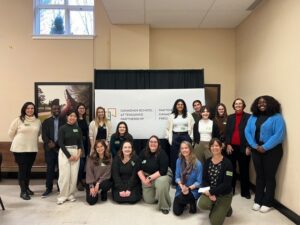
Dr Vadeboncoeur is a Professor in the Faculty of Education at the University of British Columbia.
Dr. Vadeboncoeur studies student-teacher relationships in alternative programs and the expanded social futures enabled by moral imagining. Her research examines place-making through walking methodologies and counter-mapping.

Maria A. Rogers is a Canada Research Chair and Associate Professor of Psychology at Carleton University in Ottawa, Canada. Her research and clinical practice focuses on the relational health of children and youth in the school setting, particularly for those with neurodevelopmental disorders, like ADHD. Maria is co-founder and co-director of the Canadian School Attendance Partnership – a group of researchers and community groups working to address school attendance problems in Canada.

David Smith is Professor of Counselling Psychology at the Faculty of Education, University of Ottawa in Canada. He conducts research on school-based bullying prevention programs and school climate, and on the links between mental health and bullying. David is co-founder and co-director of the Canadian School Attendance Partnership – a group of researchers and community groups working to address school attendance problems in Canada.

Natasha McBrearty is a registered psychotherapist, health administrator, and doctoral candidate in public health in Eastern Ontario, Canada. Natasha is co-founder and co-director of the Canadian School Attendance Partnership – a group of researchers and community groups working to address school attendance problems in Canada.

Jess Whitley is a Professor of Inclusive Education in the Faculty of Education at the University of Ottawa in Canada. Jess conducts research on school attendance and absenteeism, school inclusion/exclusion, mental health literacy, inclusive education policy, teacher preparation for inclusive education, and the wellbeing of children and youth with mental health issues. Jess is co-founder and co-director of the Canadian School Attendance Partnership – a group of researchers and community groups working to address school attendance problems in Canada.
Information in the menus below was updated in April 2025. To contribute information that may be of interest to others in your country, please contact your country’s hosts: Jennifer Vadeboncoeur (j.vadeboncoeur@ubc.ca), Maria Rogers (maria.rogers@carleton.ca), Jess Whitley (jwhitley@uottawa.ca), David Smith (David.Smith@uottawa.ca), or Natasha McBrearty (nmcbr057@uottawa.ca).
The Canadian School Attendance Partnership (CSAP) is a newly formed community-university research collaboration based in Ottawa, Ontario, that is focused on investigating attendance-related issues among children and youth and its connections to important social, psychological, educational, and health outcomes that are vital to positive child development. The roots of CSAP were planted in 2017 via collaboration with Michael Hone and Natasha McBrearty at Crossroads Children’s Mental Health Centre in Ottawa and researchers at the University of Ottawa, namely, Dr. Jess Whitley, Dr. David Smith, and Dr. Maria Rogers. This initial collaboration grew and now, under the CSAP banner, includes many community affiliates throughout Eastern Ontario, such as the Children’s Hospital of Eastern Ontario, Coordinated Access, and local school boards among many others.
One of our primary goals we have set for this partnership is to foster international, multi-sectoral research collaborations with diverse stakeholders and lead to a better understanding of the social, psychological, and health challenges that interfere with school attendance and consequently hinder the educational progress of children and youth. To find out more about the work being done by CSAP, please visit the CSAP website. If you are interested in joining this research collaborative, please contact the CSAP executive team and we will be happy to speak to you about your interest our research collaborative.
Not for profit

Summit Review:
In November 2024, CSAP hosted our second Annual Strategic Research Collaboration Summit on School Attendance. The summit encouraged thoughtful discussions and inquiries as to how we can better understand school attendance, particularly from the student perspective. We also learned about concrete solutions to promoting school attendance and how to effectively implement these strategies. Our partners' expertise and contributions are highly valued and it is through such partnerships that real change can be fostered.
Recent Publications:
Reports
Mokhtarian, N., Smith, D.J., Whitley, J., Rogers, M., McBrearty, N. (2024). Roll call: A scoping review for school attendance problems among youth. (Full-Text).
Smith, D.J., Mokhtarian, N., Whitley, J., Rogers, M., & McBrearty, N. (2022). Roll call: A scoping review for knowledge synthesis of literatures pertaining to school attendance problems. (Evidence Brief) (Full-Text).
Peer Reviewed Publications
Klan, A., & Whitley, J. (Pre-print). An exploration of school attendance problems experienced by children receiving mental health services. Educational and Child Psychology.
Rogers, M., & Aglukark, K. (2024). Supporting school attendance among Indigenous children and youth in Canada: A rapid review and call to action. First Peoples Child & Family Review.
Rogers, M., Klan, A., Oram, R., Krause, A., Whitley, J., Smith, D. J., & McBrearty, N. (2024). School absenteeism and child mental health: A mixed-methods study of internalizing and externalizing symptoms. School Mental Health. https://doi.org/10.1007/s12310-024-09640-2
Non Peer Reviewed and Other Media
Carmen, T., & Rogers, M. A. (2024, Mar 27). Kids are missing more school since the pandemic. CBC News. Article: https://www.cbc.ca/news/canada/school-absence-data-1.7156254; Video: https://youtu.be/59upyU2zdas?si=Tu4KGsY3ZgW35_qd
Dabaghi-Pacheco, O., & Rogers, M. A. (2024, Jan 8). Maria Rogers comments on Quebec students return to school after the strike. CBC News. (Video pt.1; pt.2)
Krause, A., Klan, A., Rogers, M., Tatartcheff-Quesnel, N., Whitley, J., & Smith, J.D. (2021). Student attendance and engagement: What have we learned from the pivot to virtual learning? Psynopsis, 43(3). https://cpa.ca/docs/File/Psynopsis/2021-Vol43-3/index.html#p=1
Rogers, M. (2022, Dec 12). For the sake of our kids, we can't let absenteeism become normalized. The Globe and Mail. https://www.theglobeandmail.com/opinion/article-for-the-sake-of-our-kids-we-cant-let-absenteeism-become-normalized/
Whitley, J., & Saggers, B. (2022, Oct 31). School attendance problems are complex, and our solutions need to be as well. The Conversation. https://theconversation.com/school-attendance-problems-are-complex-and-our-solutions-need-to-be-as-well-189849